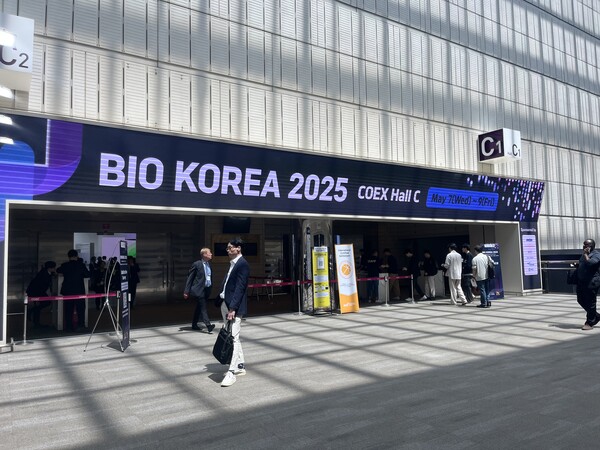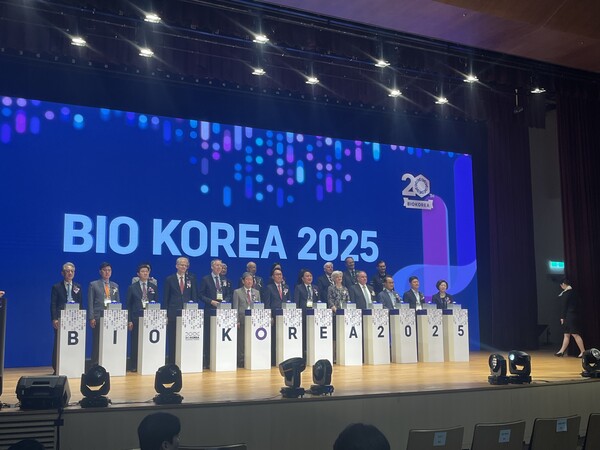Korea’s premier bio-health conference returned to COEX this week with a bigger footprint and bigger ambitions. BIO KOREA 2025, now in its 20th year, opened Wednesday in Seoul, drawing roughly 750 companies from 61 countries to a three-day exhibition that’s become a barometer of Korea’s global biotech push.
Hosted by the Korea Health Industry Development Institute (KHIDI) and North Chungcheong Province, the event serves as a crossroads for global pharma, domestic biotechs, and public-sector backers eager to court overseas investment and partnerships. This year’s theme -- “Innovation and collaboration, shaping the future together” -- wasn’t just ceremonial. It was strategic.
“The number of companies registering for business partnering has grown, and global names like Sanofi and Otsuka are back,” KHIDI President Cha Soon-do said during the opening ceremony. “It’s become a platform for joint research, development collaboration, and scaling globally.”

That partnering roster includes Johnson & Johnson, Novo Nordisk, MSD (Merck & Co. in the U.S. and Canada), Roche, Boehringer Ingelheim, Eli Lilly, and Insilico Medicine, joined by Korean firms like Celltrion, SK bioscience, ST Pharm, GC Biopharma, Yuhan Corp., and LG Chem. KHIDI said it expanded partnering booths from 56 to 68 and added a networking reception to keep dealmaking moving.
The exhibition floor showcased 429 booths from 323 companies across 20 countries. A new “Rising Pavilion” spotlighted 24 early-stage Korean biotechs with high-growth potential, while national pavilions organized by nine embassies and trade offices brought delegations from Canada, Australia, Sweden, the Netherlands, and others.
Amgen, Fujifilm, Lonza, and ABL Bio were among the multinational exhibitors sharing floor space with Celltrion and ST Pharm. "There’s a clear desire to connect upstream innovators with large-scale manufacturing and global commercialization," one chief business officer from a Korean biotech told Korea Biomedical Review on the ground. Despite the early success in initial meetings, he noted a concerning trend. “Compared to previous years, it feels like there are fewer global companies here -- especially fewer Big Pharma reps.”
Why the drop-off? “Timing could be a factor. BIO USA is just around the corner, and it’s hard for many companies to attend both when they’re only a month apart. If you’re going to prioritize, most global teams are going to pick BIO USA,” he said.
Beyond the booths, 111 speakers from 11 countries are set to take part in 14 conference sessions on topics ranging from AI drug discovery to regenerative medicine and global open innovation strategies. The keynote was delivered by Alex Zhavoronkov, CEO of Insilico Medicine, whose company is a frequent partner in AI-driven drug development.

Vice Minister of Health and Welfare Park Min-soo used his remarks to illustrate how far the country has come, and how much further it’s aiming to go. “In 2006, when BIO KOREA began, only one Korean drug had FDA approval,” he said, referencing Factive (gemifloxacin), an antibiotic developed by LG Life Sciences, now part of LG Chem. “Today, 31 Korean drugs have received approvals from the FDA or EMA, and our technology exports have grown more than 160-fold to $6.2 billion.”
LG Chem, which has evolved from that first milestone to a broader global strategy, came to BIO KOREA with a packed meeting schedule, and is now playing both sides of the partnering table. “We’re here because we’ve identified key areas of strategic focus, both for licensing in and licensing out,” a member of the business development team said. He added that the team submitted dozens of meeting requests in advance and expects to meet with nearly 50 companies across the three days.
“It’s only day one, but we’re actively trying to carve out concrete partnership angles,” the exec said. “Conferences like this don’t close deals, but they open the door. From that perspective, BIO KOREA has already proven valuable.”
Vice Minister Park cited biosimilar penetration as a high point, pointing to Celltrion and Samsung Bioepis surpassing 50 percent market share in Europe’s biosimilar space last year. Remsima, Celltrion’s infliximab biosimilar, now generates over 1.2 trillion won ($859 million) in annual revenue. “We’re now third in the world, after the U.S. and China, in terms of promising new modalities in the pipeline,” he said.
Yet Park was quick to acknowledge that Korea’s regulatory and policy environment still needs work. “We will spare no effort,” he said, outlining a multi-pronged strategy that includes the creation of a 1 trillion won K-Bio Vaccine Fund, expanded R&D subsidies, and deeper international ties through JLABS Korea, Johnson & Johnson’s local accelerator.
The geopolitical backdrop wasn’t ignored. Park said Korea’s bio-health sector is grappling with challenges stemming from recent U.S. trade shifts but promised the government would respond “swiftly and proactively” to turn uncertainty into opportunity.
North Chungcheong Province, which co-hosted the event, made a pitch of its own. Governor Kim Young-hwan unveiled plans for K-Bio Square, a biotech innovation district modeled after Boston’s Kendall Square. “I visited Kendall Square and saw firsthand how universities, startups, pharma, and hospitals create synergy,” Kim said. “We’re building that ecosystem here.”
Construction is already underway on a biomedical campus, a bio-AI high school, and an R&D hospital, he said, adding that the province has secured 1.2 million pyeong -- roughly 4 million square meters -- of land for the initiative.
Related articles
- Korea’s bio-health industry sales dip 0.7% in 2023, but pharma and R&D see growth
- KHIDI leads Korea’s biotech push at BIO USA with investor forum and Boston pitch event
- KHIDI expert calls for drug supply chain reform in Korea
- Medical Korea 2025 to showcase AI-driven healthcare innovation, global cooperation
- Australia marks 10th anniversary of partnership at BIO Korea
- BIO Korea 2024 kicks off 3-day run in Seoul
- [BIO KOREA 2025] Insilico CEO pushes Korea to greenlight 1st anti-aging drug
- [BIO KOREA 2025] AstraZeneca brings BioVentureHub model to Korea with trust-first startup partnerships
- [BIO KOREA 2025] Yuhan charts post-lazertinib future as FDA win fuels next-gen pipeline
- [BIO KOREA 2025] MSD bets big on Korean biotech for open innovation
- [BIO KOREA 2025] With tariffs looming, Celltrion backs biologics push with US stockpile
- [BIO KOREA 2025] ST Pharm eyes 'ton-scale' RNA capacity with help from biologics and peptide playbooks
- Korea turns to Nordics, Novo Nordisk to cross biotech ‘valley of death’

